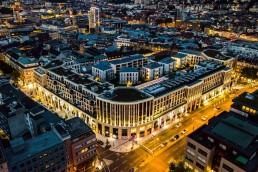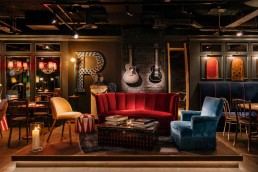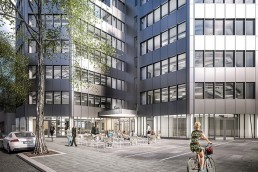German hospitality brand Ruby Hotels has announced the expansion of Ruby Lissi – its third Vienna project, initially opened in 2017 – with the addition of 64 new guest and resident rooms, a lounge, and a two-story bar and roof terrace.
Located in the historic city centre and occupying an 18th century former monastery, Ruby Lissi was inspired by the project’s namesake – Empress Elisabeth of Austria – with interiors incorporating handpicked vintage furnishings and original detailing inspired by 19th century European travel.
“Vienna was the starting signal for Ruby – our first hotel in the famous Sophiensaele theatre opened here. For this very reason, I’m delighted that we can further grow our Vienna offering by expanding Ruby Lissi,” comments Ruby Founder and CEO Michael Struck. “We want the new Ruby Bar with its roof terrace to blend seamlessly into the buzz of the first district, which we hope will create a new favourite place for many locals.”
The hotel’s new Resident rooms – a category introduced at 2019’s Ruby Leni in Dusseldorf – will include more spacious layouts, larger wardrobes, and a small fridge and coffee machine suited to longer stays. Resident rooms also come with access to a dedicated kitchen and lounge on the property’s top floor. The new elements are set to be complete by 2021, with the property currently preparing to reopen following a period of closure due to the Coronavirus pandemic.
The announcement forms part of the brand’s ongoing expansion plan that included the recent reveal of properties in Geneva and Stuttgart, set to launch in 2022 and 2023 respectively.
Struck has also shared his thoughts on the future of travel in a post-COVID world: “There is no question that the COVID-19 pandemic will change travel as we know it. As it becomes increasingly clear that social distancing is here to stay, hotels with a high degree of automation and intelligent use of technology are predicted to come out in front.
“Thanks to proprietary technical innovations, we plan, build and organise ourselves differently from conventional hotels.” he adds. “We design and structure our properties in a very modular way, centralising and automating processes behind the scenes wherever possible. This means that we can run our hotels on lower staff levels than many of our peers. Plus, we can give our guests the option: How much interaction do you want?”
The human touch is important to us all. But in times like these, it is good to have the option to minimise social contact.”
Related Posts
13 May 2020
Ruby Stuttgart set for 2023 opening
7 April 2020
Feature: Ruby Lucy, London
16 October 2018



